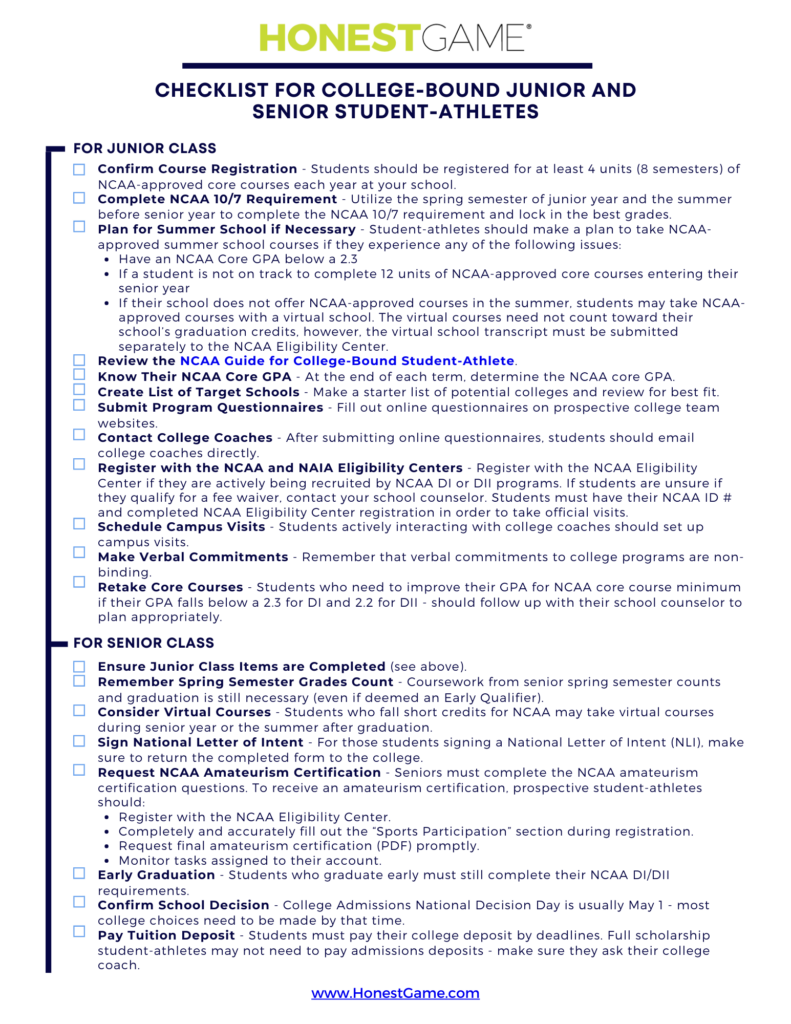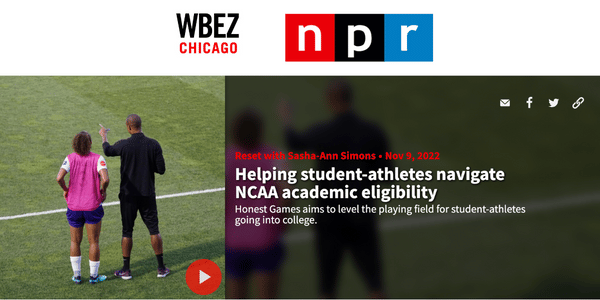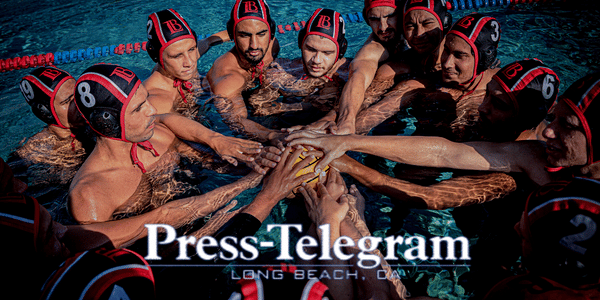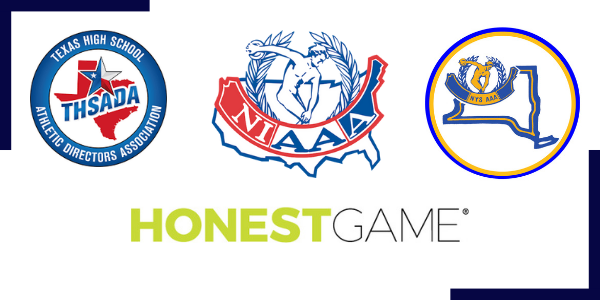How to Set Junior & Senior Student-Athletes Up for Success
Updated on Aug 8, 2023

Thousands of high school student-athletes are currently in the process of signing their National Letters of Intent (NLI) and preparing for the next step in their athletic-scholar career. But sometimes the most important tasks come after they put pen to paper!
By talking to student-athletes about the expectations and deadlines that junior and senior student-athletes will face, school administrators, coaches, and parents/guardians can help their students avoid common academic eligibility errors and successfully guide them on their pathway to play college sports.
Honest Game has highlighted the most important steps junior and senior high school student-athletes need to complete to be academically eligible to play at the college level.
Junior Year
- Confirm Course Registration – Students should be registered for at least 4 units (8 semesters) of NCAA-approved core courses each year at your school.
- Complete NCAA 10/7 Requirement – Utilize the spring semester of junior year and the summer before senior year to complete the NCAA 10/7 requirement and lock in the best grades. The NCAA 10/7 Requirement states that students must complete 10 of their 16 NCAA Core Courses prior to the start of their senior year of high school – and 7 of those 10 courses must be in English, Math, or Natural/Physical Science.
- Plan for Summer School if Necessary – Student-athletes should make a plan to take NCAA-approved summer school courses if they experience any of the following issues:
- Have an NCAA Core GPA below a 2.3
- If a student is not on track to complete 12 units of NCAA-approved core courses entering their senior year
- If their school does not offer NCAA-approved courses in the summer, students may take NCAA-approved courses with a virtual school. The virtual courses need not count toward their school’s graduation credits, however, the virtual school transcript must be submitted separately to the NCAA Eligibility Center.
- Review the NCAA Guide – The NCAA Guide for College-Bound Student-Athletes is a comprehensive resource that is full of helpful information that provides detailed guidance on a wide range of issues.
- Know Their NCAA Core GPA – At the end of each term, determine the NCAA core GPA. If an NCAA core GPA is below a 2.3 (for NCAA DI), students should meet with a school counselor to talk through goal-setting and review their Honest Game CARE® (College Athletic Report on Eligibility).
- Create a List of Target Schools – Make a starter list of potential colleges and review for best fit.
- Submit Program Questionnaires – Fill out online questionnaires on prospective college team websites.
- Contact College Coaches – After submitting online questionnaires, students should email college coaches directly. Honest Game’s blog on “How to Talk with College Coaches” offers insight on how to show your best self when talking with prospective schools and their coaching staff. In each outreach, students should be sure to include:
- 3 – 4 minute highlight reel, such as a YouTube link or Hudl account, of competition and/or practice.
- 1 page PDF profile or resume including athletic and academic honors.
- An unofficial high school transcript and/or Honest Game CARE®.
- Short introduction that addresses: why the student is interested in the college and where and when the coach can see the student play live.
- Register with the NCAA and NAIA Eligibility Centers – Register with the NCAA Eligibility Center if they are actively being recruited by NCAA DI or DII programs. If students are unsure if they qualify for a fee waiver, contact your school counselor. Students must have their NCAA ID # and completed NCAA Eligibility Center registration in order to take official visits.
- Schedule Campus Visits – Students actively interacting with college coaches should set up campus visits.
- Make Verbal Commitment to School – Remember that verbal commitments to college programs are non-binding.
- Retake Core Courses – Students who need to improve their GPA for NCAA core course minimum if their GPA falls below a 2.3 for DI and 2.2 for DII – should follow up with their school counselor to plan appropriately.
Senior Year
- Ensure Junior Class Items are Completed
- Spring Semester Grades Count – Remember that coursework from senior spring semester counts and graduation is still necessary (even if deemed an Early Qualifier).
- Consider Virtual Courses – Students who fall short credits for NCAA may take virtual courses during senior year or the summer after graduation.
- Sign National Letter of Intent – For those students signing a National Letter of Intent (NLI), make sure to return the completed form to the college.
- Request NCAA Amateurism Certification – Seniors must complete the NCAA amateurism certification questions. According to the NCAA, “prospective student-athletes enrolling for the first time at a Division I or II school must receive a final amateurism certification before being eligible to compete. This includes transfers from junior colleges, NAIA, international or Division III schools”. To receive an amateurism certification, prospective student-athletes should:
- Register with the NCAA Eligibility Center.
- Completely and accurately fill out the “Sports Participation” section during registration.
- Request final amateurism certification (PDF) promptly.
- Monitor tasks assigned to their account.
- Early Graduation – Students who graduate early must still complete their NCAA DI/DII requirements. Learn more about the process in Honest Game’s blog, “What to Consider If You Decide to Graduate Early”.
- Confirm School Decision – College Admissions National Decision Day is usually May 1 – most college choices need to be made by that time.
- Pay Tuition Deposit – Students must pay their college deposit by deadlines. Full scholarship student-athletes may not need to pay admissions deposits – make sure they ask their college coach.
Download and print the checklist above to help keep your junior and senior student-athletes on track!
As the industry-leading on-demand academic compliance solution, Honest Game technology helps educators ensure their schools and student-athletes are tracking with NCAA and NAIA requirements for college athletics. Find out how Honest Game takes the guesswork out of academic eligibility for college sports.

As a former Senior Associate Athletic Director at the NCAA Division I level and with more than 20 years of experience in collegiate athletics, Courtney has advised thousands of student-athletes through the college recruiting and eligibility process for college sports. Interested in virtual counseling with Courtney? Sign up here.





